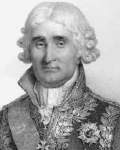Born in the family of a town mayor; studied law at Montpellier, where was admitted to the bar (1772); was appointed counselor (16 Nov 1774) in the court of accounts, aid and finances at Montpellier; elected (31 Mar 1789) as a representative of the nobility of Montpellier to the États-Généraux (Estates-General); did not take seat because of reduction of the number of representatives for Montpellier; elected (13 Sep 1791) president of the criminal tribunal of Hérault; was elected to the Convention nationale (National Convention), representing the département of Hérault (1792-1795); member of the committee for legislation; voted for the death sentence in the trial of King Louis XVI to take effect only if France was invaded; drafted a civil code, not enacted; was elected president of the National Convention (7 Oct 1794 - 22 Oct 1794); appointed a member of the Comité de salut public (Committee of Public Safety) (5 Nov 1794 - 5 Mar 1795, 4 Apr 1795 - 2 Aug 1795, 1 Sep 1795 - 4 Nov 1795); was instrumental in concluding the peace treaties with Tuscany, Prussia, the Dutch, and Spain (1795); elected (13 Oct 1795) to the Corps législatif by several départements, opted for Hérault; selected to sit in the Conseil des Cinq-Cents (Council of Five Hundred) (1795-1797); president of the Council of Five Hundred (22 Oct 1796 - 21 Nov 1796); served as minister of justice and keeper of the state seal (20 Jul 1799 - 25 Dec 1799); assisted Napoléon Bonaparte with the preparation of the coup d'état of 18 Brumaire, Year VIII (9 Nov 1799 - 10 Nov 1799); was proclaimed Second Consul de la République française (Second Consul of the French Republic) in the Constitution of the Year VIII (served 25 Dec 1799 - 18 May 1804); created archichancelier de l'Empire (archchancellor of the Empire) (from 18 May 1804) and duke of Parma (from 19 Mar 1808); exercised wide authority during Napoléon's absences, while presiding over the Sénat and the Conseil d'Etat (Council of State); was excluded from public life at the restoration of the Bourbon monarchy (1814); again held the office of minister of justice and keeper of the state seal (20 Mar 1815 - 24 Jun 1815) during the Cent-Jours (Hundred Days); served as president of the Chambre des pairs (Chamber of Peers) (1815); was exiled at the Second Restoration; lived in the Kingdom of the Netherlands until 1818, when was allowed to return to France.
Biography source: [3] [4] |

